- Home
- Philip Pullman
The Scarecrow and His Servant Page 2
The Scarecrow and His Servant Read online
Page 2
“No,” she said. “Well, I'll be on my way. Thank you, sir,” she said, curtsying again to the Scarecrow, who raised his hat and bowed.
And off she went.
Jack sighed and followed the Scarecrow, who was already striding off toward the top of the hill.
When they reached the top, they saw a ruined castle. There was one tower that was still standing, and some walls and battlements, but everything else had tumbled down and was covered in ivy.
“What a spooky place,” said Jack. “I wouldn't like to go near it at night.”
“Courage, Jack!” said the Scarecrow. “Look— there's a spring. What did I tell you? Drink your fill, my boy!”
It was true. The spring bubbled out of the rocks beside the castle and flowed into a little pool, and as soon as he saw it, Jack gave a cry of delight and plunged his face deep into the icy water, swallowing and swallowing until he wasn't thirsty anymore.
Finally, he emerged and heard the Scarecrow calling.
“Jack! Jack! In here! Look!”
Jack ran through the doorway at the foot of the tower and found the Scarecrow looking around at all kinds of things: in one corner, barrels of gunpowder, muskets, swords and daggers and pikes; and in another corner, chests and boxes of gold coins and silver chains and glittering jewels of every color; and in a third corner—
“Food!” cried Jack.
There were great smoked hams hanging from the ceiling, cheeses as big as cartwheels, onions in strings, boxes of apples, pies of every kind, bread, biscuits, and spice cakes and fruitcakes and butter cakes and honey cakes in abundance.
It was no good even trying to resist. Jack seized a pie as big as his own head, and a moment later he was sitting in the middle of the food, chewing away merrily, while the Scarecrow watched in satisfaction.
“What a stroke of luck finding this!” he said. “And no one knows about it at all. If only that old lady knew about it, she could come and help herself, and she wouldn't be poor anymore.”
“Well,” said Jack, swallowing a mouthful of pie and picking up a spice cake, “it's not quite like that, master. I bet all this belongs to the brigands, and we better clear off soon, because if they catch us, they'll cut our throats.”
“But I haven't got a throat.”
“Well, I have, and I don't want it cut,” said Jack. “Look, we can't stay here. Let's grab some of the food and scram.”
“Shame on you!” said the Scarecrow sternly. “Where's your courage? Where's your honor? We're going to scare these brigands away, and scare them so badly that they never come back. I wouldn't be surprised if we won a grand reward. Why, they might even make me a duke! Or give me a gold medal. No, it wouldn't surprise me a bit.”
“Well,” said Jack, “maybe.”
Suddenly the Scarecrow pointed at a heap of straw.
“Oh, look—what's that?” he said.
There was something moving. A little creature the size of a mouse was crawling feebly around in a heap of straw on the floor. They both bent over to look at it.
“It's a baby bird,” said Jack.
“It's an owl chick, that's what it is,” said the Scarecrow severely. “These parents have no sense of responsibility. Look at that nest up there! Downright dangerous.”
He pointed to an untidy bundle of twigs in a crack high up in the wall.
“Well, there's only one thing for it,” he said. “You keep guard, Jack, while I return this infant to his cradle.”
“But—” Jack tried to protest.
The Scarecrow took no notice. He bent over and picked up the little bird and tucked it tenderly into his pocket, making gentle clucking noises to soothe it. Then he began to clamber perilously up the sheer face of the wall, jamming his hands and feet into the cracks.
“Master! Take care!” called Jack in a fever of anxiety. “If you fall down, you'll snap like a dry stick!”
The Scarecrow didn't listen, because he was concentrating hard. Jack scampered to the door and looked around. Darkness was gathering, but there was no sign of any brigands. He scampered back in and saw the Scarecrow high up and clinging to the wall with one hand while fumbling in his pocket with the other, then reaching up and carefully putting the little bird back into the nest.
“Now you sit still,” he said sternly. “No more squirming, you understand? If you can't fly, don't squirm. When I see your parents, I shall have a word with them.”
Then he began to clamber back down the wall. It looked so dangerous that Jack hardly dared watch, but finally the Scarecrow reached the floor again and brushed his hands firmly.
“I thought the birds were your enemy, master,” said Jack.
“Not the children, Jack! Good gracious me. Any man of honor would sooner bite off his own leg than hurt a child. Heaven forfend!”
“Blimey,” said Jack.
While the Scarecrow pottered about in the ruins, looking at everything with great curiosity, Jack gathered up a couple of pies, a loaf of bread, and half a dozen apples and put them in a leather bag he found hanging on a hook next to the muskets. He hid it among the ivy growing over the tumbled wall outside.
The sun had set by this time, and it was nearly dark. Jack sat on the stones and thought about brig-ands. What did they do to people they caught? They weren't like scarecrows, or men of honor; they were more like soldiers, probably. They were bound to do horrible things, like tying you up and cutting bits off you, or dangling you over a fire, or putting earwigs up your nose. They might take all your ribs out. They might cram your trousers full of fireworks. They might—
Someone tapped him on the shoulder, and Jack leapt up with a yell.
“My word,” said the Scarecrow admiringly, “that's a fine noise. I was just going to tell you that the brig-ands are coming.”
“What?” said Jack in terror.
“Come, come,” said the Scarecrow. “It's only a small flock—not more than twenty, I'd say. And I've got a plan.”
“Let's hear it, quick!”
“Very well. Here it is: we'll hide in the castle until they're all inside, and then we'll scare them, and then they'll run away. How's that?”
Jack was speechless. The Scarecrow beamed.
“Come along,” he said. “I've found an excellent place to hide.”
Helplessly, Jack followed his master back into the tower and looked all around in the dimness.
“Where's this excellent place to hide?” he said.
“Why, over there!” said the Scarecrow, pointing to a corner of the room in plain sight. “They'll never think of looking there.”
“But—but—but—”
Jack could already hear the clop of horses' hooves outside. He scrunched himself down in the corner beside the Scarecrow, and squeezed his knees together to stop them knocking, and put his hands over his eyes so that no one could see him, and waited for the brigands to come in.
Chapter Three
A Story by the Fireside
They were a disciplined band, those brigands. Jack watched between his fingers as they came in silently and sat around the fireplace. The chief brigand was a ferocious-looking man, with two belts full of bullets crisscrossed over his shoulders, another one round his waist, a cutlass, two pistols, and three daggers: one in his belt, another strapped to his arm, and the third in the top of his boot. What's more, if he lost all his other weapons he could still stab two people with his mustache, which was waxed into long points as sharp as a pin.
His eyes glared and rolled as he looked around at his men, and Jack was almost sure they gave out sparks.
Any second now he'll see us, Jack thought. So it was despair as much as bravado that made him stand up and say:
“Good evening, gentlemen, and welcome to my master's castle!”
And he swept a low bow.
When he stood up, he saw twenty swords and twenty pistols all pointing at him, and twenty pairs of eyes, each eye just like the end of a pistol barrel.
The chief brigand roared: “
Who's this?”
“It's a mad boy, Captain,” said one of the men. “Shall we roast him?”
“No,” said the chief, coming close and touching Jack's ribs with the point of his sword. “There's no meat on him. He's all bone and gris-tle. He might flavor a stew, I suppose. Turn around, boy.”
Jack turned around and then turned back again. The chief brigand was shaking his head doubtfully.
“You say this is your master's castle?” he said.
“Indeed it is, sir, and you're most welcome,” said Jack.
“And who's your master?”
“My Lord Scarecrow,” said Jack, pointing to the Scarecrow in the corner, who was lying propped against the wall as still as a turnip, a suit of old clothes, and a few sticks could lie.
The chief brigand roared with laughter, and all his well-trained band slapped their thighs and held their sides and bellowed with mirth.
“He is mad!” cried the chief brigand. “He's lost his wits!”
“Indeed I have, sir,” said Jack. “I've been looking for them for months.”
“What do mad boys taste like?” said one of the brigands. “Do they taste different from normal ones?”
“Spicier,” said another. “More of a peppery taste.”
“No!” said the chief. “We won't eat him. We'll keep him as a pet. We'll teach him to do tricks. Here, mad boy—turn a somersault, go on.”
Jack turned a somersault and stood up again.
“He's quick, isn't he?” said one brigand.
“Bet he can't dance, though,” said another.
“Mad boy!” roared the chief. “Dance!”
Jack obediently capered like a monkey. Then he capered like a frog, and then he capered like a goat. The brigands were in a good mood by now, and they roared with laughter and clapped their hands.
“Wine!” bellowed the chief. “Mad boy, stop dancing and pour us some wine!”
Jack found a big flagon of wine and went around the circle of brigands, filling up the horn cups they were all holding out.
“A toast!” the chief brigand said. “To plunder!”
“To plunder!” the brigands shouted, and drank the wine in one gulp, so Jack had to go all the way around and fill the cups again.
Meanwhile, some of the brigands were lighting a fire and cutting up great joints of meat. Jack looked at the meat uneasily, but it looked like proper beef, and it certainly smelled good when it started to cook.
While it was roasting, the chief brigand counted out the jewels and gold they'd plundered and divided it all into twenty heaps, one big one and nineteen little ones; and as he was doing that, he said, “Here, mad boy—tell us a story.”
Well, that was a hard one for Jack. However, if he didn't do it, there'd be big trouble; so he sat down and began.
“Once upon a time,” he said, “there was a band of brigands living in a cave. They were cruel and wicked—oh, you could never imagine such terrible men. Every one of them was a qualified murderer.
“Anyway, one day they fell to quarreling among themselves, and before they knew it, one of them lay dead on the floor of the cave.
“So the chief said, ‘Take him out and bury him. He makes the place look untidy.’
“And they picked the dead man up and took him outside and dug a hole for him, and they put him in and shoveled the earth back on top, but he kept throwing it out.
“‘You're not burying me!’ he said, and he climbed out of the grave.
“‘Oh yes, we are!’ they said, and they tried to shove him back in, but he wouldn't go. Every time they got him in the grave, he climbed out again, and he was as dead as a doornail. Finally, they got him in, and seven of them sat on him while the others piled rocks on top, and that did it.
“‘He won't get out of that,’ said the chief, and they went back in the cave and lit a fire to make supper. They had a big meal and lots of wine and then they lay down to sleep.
“But in the middle of the night, one of the brig-ands woke up. The cave was all silent, and the moonlight was shining in through the entrance. What woke him up was a sound, like a rock moving quietly on another rock, not loud at all, just a quiet sort of scraping noise. This man lay there with his eyes wide open, just listening as hard as he could. Then he heard it again.”
All the brigands were sitting stock-still, and they gazed fearfully at Jack with wide eyes.
Help, he thought, what am I going to say next?
But he didn't have to say anything, because into the silence there came a little scraping sound, like a rock moving quietly on another rock.
All the brigands jumped, and they all gave a little squeak of terror.
“And then,” said Jack, “he saw … Look! Look!” And he pointed dramatically to the corner where the Scarecrow was lying. Every head turned around at once.
The Scarecrow slowly lifted his head and stared at them with his knobbly turnip face.
All the brigands gasped, including the chief.
And the Scarecrow stretched out his arms and bent his legs, and stood up, and took one step toward them—
And every single brigand leapt to his feet and fled, screaming with terror. They fell over—they knocked one another out of the way—the ones that fell over got trampled on, and the ones that trampled on them got their feet caught and fell over themselves, to be trampled on in their turn—and
some of them fell into the fire and leapt up squealing with pain, and that scattered the burning logs so that the cave was dark, and that made them even more frightened, so they shrieked and yelled in mortal fear—and those who could still see a little saw the Scarecrow's great knobbly face coming toward them and scrambled even harder to get away—
And no more than ten seconds later the brigands were all running away down the road, screaming with terror.
Jack stood in the doorway in amazement, watching them disappear into the distance.
“Well, master,” he said, “it happened just as you said it would.”
“Timing, you see,” said the Scarecrow. “The secret of all good scaring. I waited till they were feeling at their ease, lulled and comfortable, you know, and then I got up and scared them good and proper. It was the last thing they expected. I expect your story helped a little,” he added. “It probably put them in a sort of peaceful mood.”
“Hmm,” said Jack. “But I bet they come back, because they haven't eaten their dinner. I reckon we should scarper before they do.”
“Believe me,” said the Scarecrow solemnly, “those rascals will never come back. They're not like birds, you see. With birds you need to keep scaring them afresh every day, but once is enough for brigands.”
“Well, you were right once, master. Perhaps you're right again.”
“You can depend on it, my boy! But you know, you shouldn't have told the brigands that I was the lord of this castle. That wasn't strictly true. I'm really the lord of Spring Valley.”
“Spring Valley? Where's that?”
“Oh, miles away. Ever so far. But it all belongs to me.”
“Does it?” “Every inch. The farm, the wells, the fountains, the streams—all of it.”
“But how do you know, master? I mean, can you prove it?”
“The name of Spring Valley is written in my heart, Jack! Anyway, now I've had a rest, I'm eager to be on our way and see the world by moonlight. Perhaps we'll meet the parents of that poor little owl chick. My word, I look forward to scaring them. Take as much food as you like—the brigands won't need it now.”
So Jack took the bag of food he'd hidden earlier and added a pie and a cold roast chicken for good measure, then followed his master out onto the high road, which was shining bright under the moon.
At that very moment, Mr. Cercorelli the lawyer was sitting at a rough wooden table in a cottage kitchen, opposite an old woman who was eating bread and cheese.
“Like a scarecrow, you say?” he said, making a note.
“Yes, sir, horrible ugly brute he was. He leapt ou
t of the bushes at me. Lord! I thought my last hour had come. He give me such a start that I dropped all me bread and cheese, and it was only when young master Buffaloni and his nice friends come along and chased him away that I felt safe again.”
“And did you see which way he went, this footpad who looked like a scarecrow?”
“Yes, sir. He went up into the hills. I shouldn't wonder if he's got a gang of marauding villains up there with him.”
“No doubt. Was he alone on this occasion?”
“No, sir. He had a young boy with him. Vicious-looking lad. Foreign, probably.”
“A young boy, eh?” said the lawyer, making another note. “Thank you. That is very interesting. By the way,” he said, because he hadn't eaten all day, “that cheese looks remarkably good.”
“Yes, it is,” said the old woman, putting it away. “Very nice, indeed. Nice bit of cheese.”
Mr. Cercorelli sighed and stood up.
“If you hear any more of this desperate rogue,” he said, “be sure to let me know. Mr. Buffaloni is offering a very generous reward. Good evening to you.”
Chapter Four
The Traveling Players
After a good night's sleep under a hedge, the Scarecrow and his servant woke up on a bright and sparkling morning. “This is the life, Jack!” said the Scarecrow. “The open road, the fresh air, and adventure just around the corner.”
“The fresh air's all right for you, master,” said Jack, removing leaves from his hair, “but I like sleeping in a bed. I haven't seen a bed for so long that I can't remember whether the sheets go under the blankets or the blankets go under the sheets.”
“I shall just go and pay my respects to a colleague,” said the Scarecrow.
They'd woken up to find themselves close to a crossroads. A wooden sign stood where the roads met; but what the four arms were pointing to was impossible to read, for years of sun and rain had completely worn away the paint.
The Scarecrow strode up to the road sign and greeted it courteously. The sign took no notice, and neither did Jack, who was busy cutting a slice of cold meat with his little pocketknife and folding it inside a slice of bread.

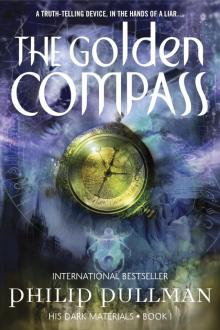 The Golden Compass
The Golden Compass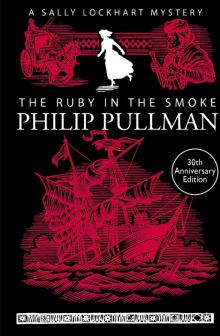 The Ruby in the Smoke
The Ruby in the Smoke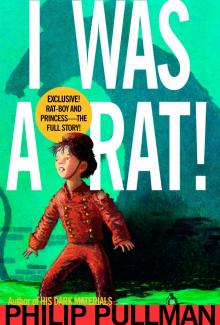 I Was a Rat!
I Was a Rat!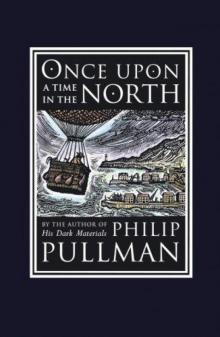 Once Upon a Time in the North
Once Upon a Time in the North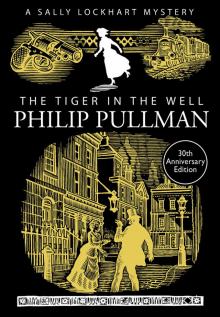 The Tiger in the Well
The Tiger in the Well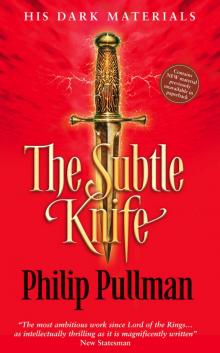 The Subtle Knife
The Subtle Knife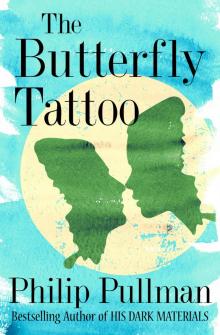 The Butterfly Tattoo
The Butterfly Tattoo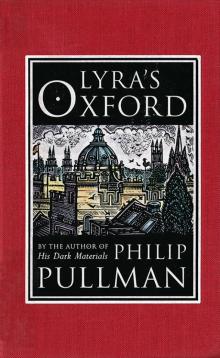 Lyra's Oxford
Lyra's Oxford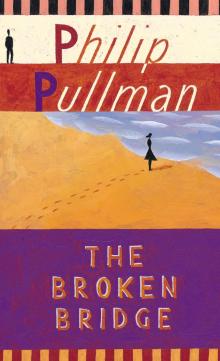 The Broken Bridge
The Broken Bridge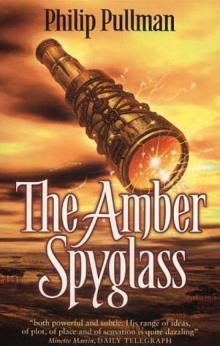 The Amber Spyglass
The Amber Spyglass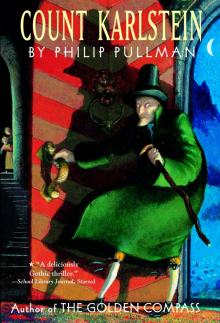 Count Karlstein
Count Karlstein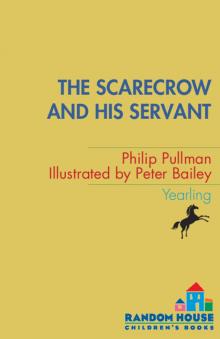 The Scarecrow and His Servant
The Scarecrow and His Servant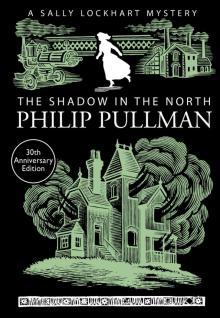 The Shadow in the North
The Shadow in the North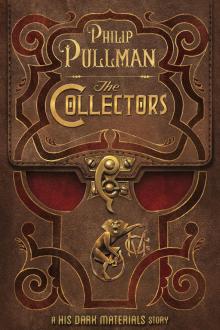 The Collectors
The Collectors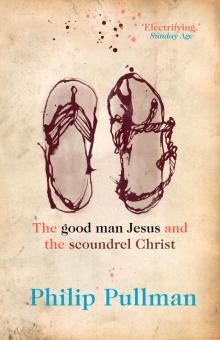 The Good Man Jesus and the Scoundrel Christ
The Good Man Jesus and the Scoundrel Christ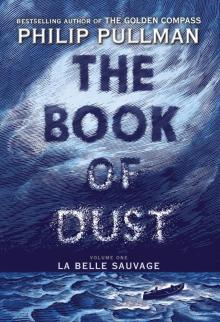 La Belle Sauvage
La Belle Sauvage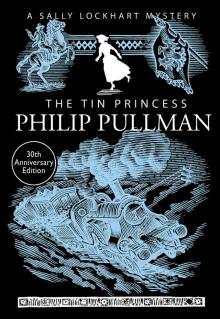 The Tin Princess
The Tin Princess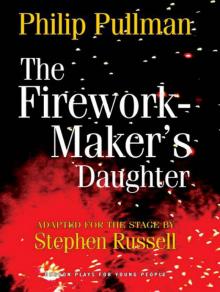 The Firework-Maker's Daughter
The Firework-Maker's Daughter The Book of Dust: The Secret Commonwealth (Book of Dust, Volume 2)
The Book of Dust: The Secret Commonwealth (Book of Dust, Volume 2)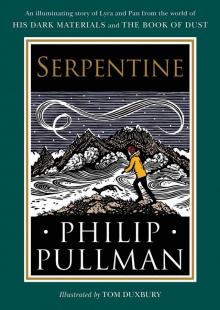 Serpentine
Serpentine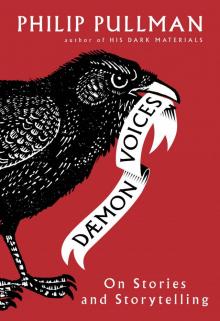 Daemon Voices
Daemon Voices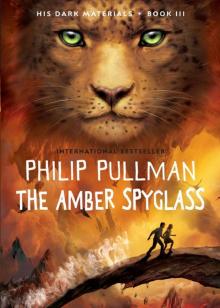 The Amber Spyglass: His Dark Materials
The Amber Spyglass: His Dark Materials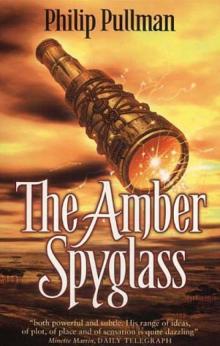 The Amber Spyglass hdm-3
The Amber Spyglass hdm-3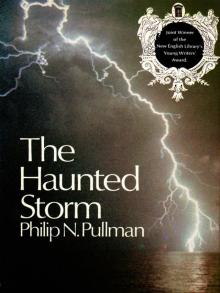 The Haunted Storm
The Haunted Storm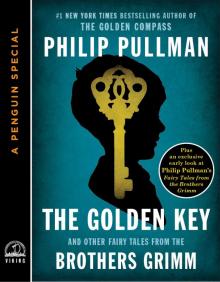 The Golden Key
The Golden Key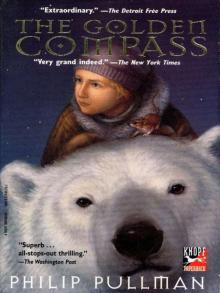 His Dark Materials 01 - The Golden Compass
His Dark Materials 01 - The Golden Compass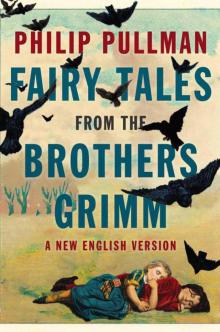 Fairy Tales from the Brothers Grimm: A New English Version
Fairy Tales from the Brothers Grimm: A New English Version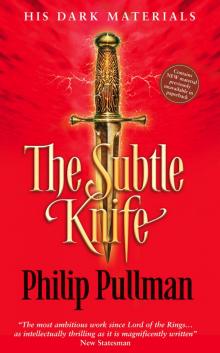 His Dark Materials 02 - The Subtle Knife
His Dark Materials 02 - The Subtle Knife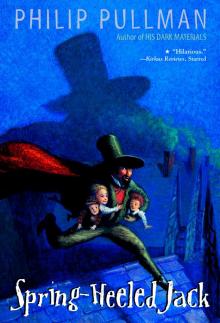 Spring-Heeled Jack
Spring-Heeled Jack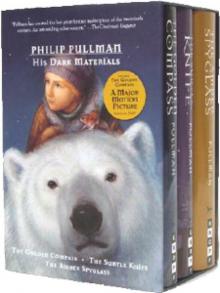 The Golden Compass hdm-1
The Golden Compass hdm-1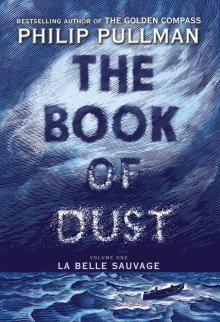 The Book of Dust, Volume 1
The Book of Dust, Volume 1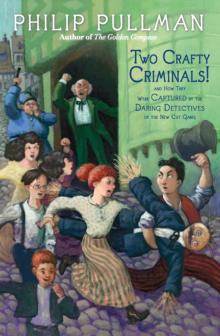 Two Crafty Criminals!
Two Crafty Criminals!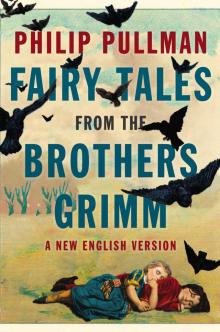 Fairy Tales from the Brothers Grimm
Fairy Tales from the Brothers Grimm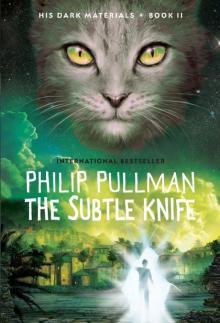 The Subtle Knife: His Dark Materials
The Subtle Knife: His Dark Materials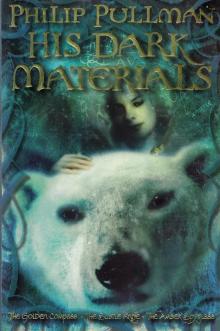 His Dark Materials Omnibus
His Dark Materials Omnibus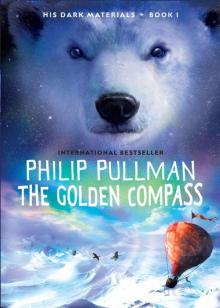 The Golden Compass: His Dark Materials
The Golden Compass: His Dark Materials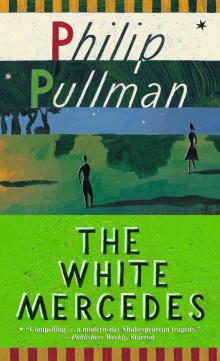 The White Mercedes
The White Mercedes